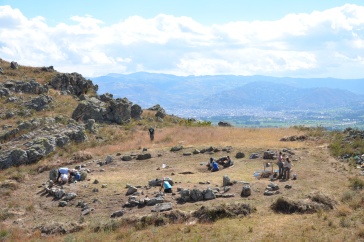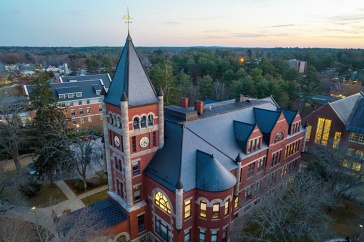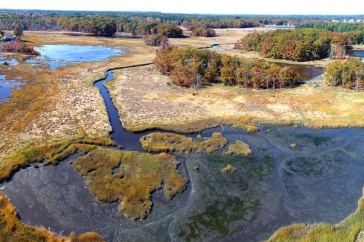
Richard Whoriskey (front, fourth from left) with Veterans of Foreign Wars in front of Hamilton Smith Hall on Armistice Day, in 1921.
Shortly after graduating from Harvard in 1897, Richard Whoriskey was hired by the New Hampshire College of Agriculture and the Mechanic Arts to take charge of the Department of Modern Languages. The first thing that people noticed about Whoriskey was his short stature and his use of a cane to help him walk. But any attention to his physical disability was soon overshadowed by his alter-ego – within his frail body was the heart of an athlete. From the start of his career, “Dick”, as he was known by students and faculty alike, attended every athletic event, found some comfort in every defeat (which was more often than not) and was a perennial fountain of encouragement and hope. He inspired the players and the other spectators with his enthusiasm.
When the United States entered World War 1, his services as a motivational speaker were requested by the New Hampshire Food Committee and he was granted leave from teaching to lecture around the state. In the summer of 1918, the federal government began sending detachments of the newly enlisted soldiers to New Hampshire College for vocational training. The army requested that lectures on morale be given as well. Whoriskey was recalled to campus to fulfill this task. He entered into the work with them with characteristic sympathy and enthusiasm. In addition to the time spent in lecturing, a great deal of his time was spent with the men when they were off duty, especially in the barracks during the evenings. After the war, he became chairman of the local branch of the European Children’s Fund. When the Parnell-Corriveau post, Veterans of Foreign Wars, was established on campus in 1920, he was made an honorary member.
On February 21, 1922, Whoriskey died at his home of influenza after several weeks of fighting the illness. According to his family, his last words were: "There'll be no mourning; there'll be no mourning."
Originally published by:
The UNH Connection
The Way We Were is written by Mylinda Woodward '97, archives assistant.
-
Written By:
Staff writer | Communications and Public Affairs

















































